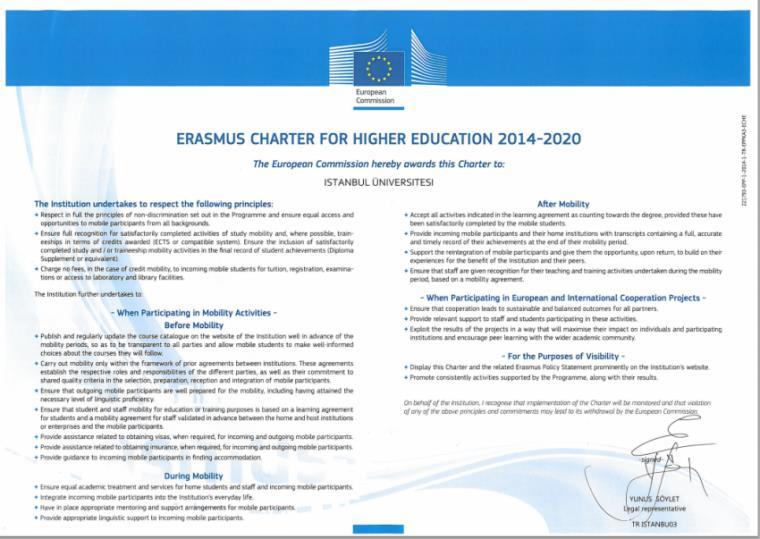MISSION:
“To train graduate educators steeped in national and universal values, respective democratic and ethical values, scientific approach, adoptive self-renew in accordance with the requirements of the age, can identify and solve problems of the world and to do research with the National and International.”
VISION:
“To be an institution has national and international standards by training highly qualified educators and scholar are the most demanding areas of educational sciences; to support researches, educational policies and approaches at national and international level.”
| Erasmus Institutional Coordinator | Assoc. Prof.Dr. Ayşe Zişan FURAT | erasmus@istanbul.edu.tr | +90 212 440 00 00 / 11222 |
| Incoming Student and Staff | Lecturer Mustafa KAPLAN | mustafa.kaplan@istanbul.edu.tr | +90 212 440 00 00 / 10272 |
| Bilateral Agreement | Dr.Gamze UŞAR | gamze.usar@istanbul.edu.tr | +90 212 440 00 00 / 12029 |
@iuerasmus
European Policy Statement
Istanbul University is involved in Erasmus activities through the perspective of its International Strategy. The University promotes and encourages students, academic and administrative staff to take part in an Erasmus exchange programme while studying or working at Istanbul University. The University offers a wide range of foreign language courses for all students and staff as well as Turkish as a Foreign Language for incoming students the I.U. Language Center. The University has a long and distinguished record in European activities through Coimbra Group Membership, several European and Erasmus Projects. Istanbul University has been an active participant in Erasmus student and staff exchanges since 2003. The University has also involved in Erasmus+, Leonardo da Vinci, H2020, Third Health Programs and Biohealth Computing Erasmus Mundus Programme. Istanbul University has been granted with the Erasmus University Charter in 2007. This new Charter further increases the opportunities available to students and faculty members (for example, student placements/traineeships abroad for three months as well as short-term research opportunities for young academic staff).
Istanbul University fully functions with the Bologna Process, designing its educational programs and procedures in accordance with it. A number of the Turkish bachelor programmes have all been covered with 30% of the courses in English. The European Credit Transfer System (ECTS) has been
enacted in all degree programs offered by the university equivalent with the standard internal credit accumulation system and the infrastructure is created to grant Diploma to the graduates. The university is authorized to give full recognition for satisfactorily completed educational activities.
Istanbul University continues to promote and implement the principles of ECTS in all its ERASMUS student exchanges. The University operates a 60 credit year system (30 ECTS credits per semester) for outgoing students. Istanbul University is committed to providing the highest quality of education for its own and international students. The syllabus of the University and standards of the University’s awards are credited by the quality assurance and enhancement mechanisms which operate within the Istanbul University’s Quality Policies.
Istanbul University will continue to promote and enhance Erasmus to students and staff within written and/or audio-visual virtual informativematerials, Orientation Days, email etc. The Erasmus Student Charter and the Erasmus Policy Statement is available on the International Academic
Relations Committee and Erasmus+ web pages. Every outgoing Erasmus student is given information about the curriculum at the host University and is advised by their academic supervisor regarding the courses which are suitable for their Istanbul University degree. Orientation meetings are offered to all outgoing and incoming Erasmus students. Istanbul University offers every incoming Erasmus student the opportunity to attend the Orientation Programme which enables all international students to integrate into the University’s system before classes begin. Istanbul University continues to support the opportunities of staff mobility. We have a total of 32 committed staff (10 Erasmus Office staff and 22 Faculty Coordinators) who regularly take part in staff mobility and support the outgoing and incoming Erasmus students. Students must complete a training and learning agreement which has to be signed by them, the employers/institutional coordinators and the students’ supervisors at Istanbul University. The student’s supervisor is responsible for providing the support and the monitoring of their learning and training mobility. Istanbul University is able to manage the new challenges in the educational field over the next decades. The University remains firmly committed to the enhancing the quality and volume of research by:
• To prepare international agreements between foreign universities and academic institutions, to evaluate and improve the current agreements byobserving the processes.
• To cooperate with the other universities and scientific corporations inorder to take an active role in collective enterprises in the international fields.
• To produce, propose and develop policies intended for effective cooperation with other international academic institutions to realize
national and institutional goals.
• To evaluate the performance of foreign teaching staff and to determine the payment criteria; to guide them to adapt themselves to the university and Turkey.
• To provide consultancy with the authorized institutions in case the visiting students/staff need help.
• To make counselling for the Faculties, Vocational Schools, and Institutions about international academic relations,
• To enable the international respectability and publicity, to increase the academic relations, to have a much more effective representation of
Istanbul University in the international academic and scientific organisations, to fulfil the tasks in accordance with the Rectorate to
organize activities such as congresses, conferences and exhibitions.
• To carry out every kind of research, study and evaluation in the contextof international academic relations.International Academic Relations Committee prepares a report including
the activities of the particular year and presents it to the Rector as a part ofinternal audit. All Departments have at least one member of staff appointed as an Exchange coordinator. These officers provide an additional contact point and supervisory advice for international students taking modules in that particular department.


Istanbul University [IU] (est. in 1453), renowned as the oldest and the most developed university in Turkey, has been a key fundamental player in advancing Turkish Higher Education. It has been at the forefront of the scientific and social advances in Turkey for centuries. Following its well-known motto of being “The Bridge of Science from the Past to the Future”, IU has maintained its positive influence on the Turkish intellectual and academic circles through the implementation of various education programmes ranging from natural sciences to arts and political sciences to theology. IU has continually strived to enhance the international dimensions of its teaching, research, outreach, service and administration.
IU’s 2019-2023 strategic plan identifies the following two fields as the main focus of its pursuit for internationalisation: (a) increasing the number of international students and staff on campus and (b) engaging in international competition through research and scientific production. In its pursuit for the implementation of its strategic plan, IU maintains its strong interest in increasing the quality and quantity of mobility while strengthening its partnerships. International engagement is a priority in IU’s quest for improving the quality of teaching, learning, and academic research, which in turn would enhance the university's overall reputation and further improving its worldwide ranking.
National and international recognition, a high institutional profile and its pioneering role in Turkish intellectual and scientific circles enables IU to be a popular partner not only in the region but also around the world. IU benefits also from its institutional ratings and location between the East and the West which also indicates one of its implicit strengths and potential to expand the European Education Area. Thus, academic quality and mutual strategic goals are considered as the main criteria for building longstanding partnerships regardless of geographical space and distance.
All of IU’s academic and administrative units actively participate in the implementation of its modernisation and internationalisation strategies. The International Academic Relations Unit [IARU] oversees international engagements, and employs the necessary means for advancing the University’s related strategies. The primary activities of the IARU are to carry out exchange programs and other academic exchange activities and internationalization strategies on behalf of the University for international and national students, academic and administrative staff. Erasmus, Mevlana, Farabi, and Bilateral-Multilateral Relations Offices administer international and national academic exchange activities under the roof of the unit. These offices are responsible not only for the administrative aspects of students, academic staff and personnel exchange but also assisting the academic units in benefitting from the current partnerships and creating new exchange opportunities.
Acknowledging the international dimension as one of the most important quality criteria, IU is committed to further implement its official vision of becoming a leading university with its education at a global level and its research shaping the world. This vision will be operationalised by strengthening its international collaborations, broadening its education potential through joint/double degree programmes, increasing its research capacity, empowering its community through new mobility opportunities, and modernising its institutional and educational structure by accommodating itself to the new developments in the European Education Area. Thus, IU identifies the following topics among the priorities which would enhance its modernization, and lay the foundations for its internationalisation as well as its quality improvement.


